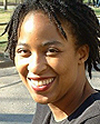| |
Camille DungyAfter Applying to Harvard, Colgate, Yale When the last letter came, reminding him
that he was black, Thornton's answering feat
left his country behind. With a Fulbright,
he sailed for England, and while out, pacing
the deck, he met the first white man with eyes
he recognized. What couldn't that man hold?
For the first time, Thornton spoke easily
of his own life: his wife, his two small girls.
He recalled his book-walled home, the kingdom
he'd abdicated, the still-minded men
who tried to keep him far from what he loved. It's very hard to live a dream at home,
Thornton told the listening man, Prince Edward,
who understood, who'd loved, who'd also left. Farm Bureau Advisor They suggested that the man who taught them
not to choke fields with tight turns of growing
but to sometimes let them breathe as deeply
as uncorseted girls, the one black man
they ever knew the government to trust
with a job and a salary, the man
who lectured at the university
when few of them read further than their names
across a ledger, yes, they suggested
that Thornton's father must have forgotten
his place when he bought that new Ford model
and drove past town onto their country roads,
and they warned him: A horse and cart will do
just fine next time you come around these parts.
Author's Statement
Groups of poems are the culmination of a journey, one more frequently meandering than direct. This is a journey that should not be rushed. To rush would mean eating fast food in the car while speeding along the interstate rather than waiting for a slow-to-cook meal with four new friends who are eager to relay a few local legends. To rush would mean missing the opportunity to visit a museum I had not known existed until one of the women mentioned it in reference to the regional anecdotes my poems were beginning to explore. Even if I could take the time to visit the museum, I would not be able to linger. Instead of talking for an hour with the guide about her town's topography and troubled past, I would have had to thank her for the scripted tour and run on, none the wiser. I would never have heard about the stone. If I had to hurry, I certainly could not take the time to drive twenty miles out of the way just to see this old stone. I would not have parked the car and walked thirty yards to touch markings that once directed fugitive slaves to the next shelter on the trail to Canada. And if I could not find the time to touch that stone, what texture would my poems know to duplicate? Poems require time in which to travel and explore. I thank the NEA for making it possible for me to secure that time.
National Endowment for the Arts · an independent federal agency
1100 Pennsylvania Avenue NW
Washington, DC 20506
|
|
| |

Camille Dungy has earned fellowships from the National Endowment for the Arts, The Corporation of Yaddo, the Ragdale Foundation, Cave Canem, and the Virginia Center for the Creative Arts. She has been a Tennessee William's Scholar at the Sewanee Writers' Workshop, Artist-in-Residence at Rocky Mountain National Park and was a finalist for the 2002 A Room of Her Own Foundation Fellowship in Poetry. A graduate of Stanford University and the MFA program at UNC-Greensboro, Dungy is now Assistant Professor of English at Randolph-Macon Woman's College in Lynchburg, VA. She has been published in various literary magazines and journals, including recently, The Missouri Review, Crab Orchard Review, and The Mid-American Review.
|
|




